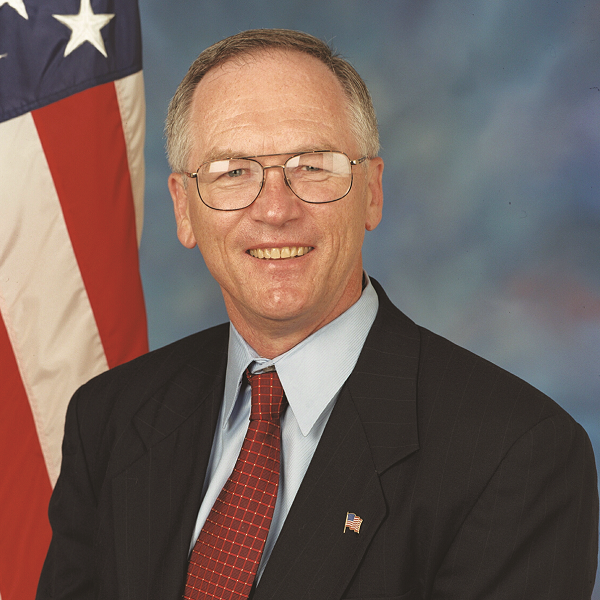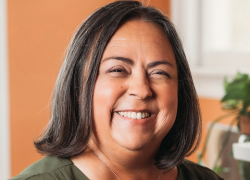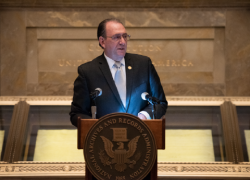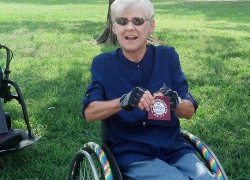This year marks 20 years since the department’s Office of Disability Employment Policy, or ODEP, was created. In honor of this milestone, ODEP Deputy Assistant Secretary Jennifer Sheehy recently talked to Dr. Roy Grizzard, who served as ODEP’s assistant secretary from 2002 to 2007.
Sheehy: Please tell us about your career prior to coming to ODEP, and how you ended up the first assistant secretary.
 Grizzard: I spent 27 years working for Henrico County Public Schools in Virginia, first as an educator and coach and later as an administrator. I then served for six years as commissioner of the Virginia Department for the Blind and Vision Impaired. That’s where I was when I came to D.C. and ODEP. I actually found out I was being considered for the position when I was down at the Virginia Leadership Institute, which is a training program for state department heads. I came back to my hotel room one night and found the message light on my phone blinking. It was my wife, who said “the White House just called and wants you to call them back.” So, that’s what I did, and I learned that the former Virginia Secretary of Health and Human Services, who was then Deputy Secretary at the federal HHS, had put my name forward for the position. I was eventually confirmed on July 26, 2002, the 12th anniversary of the Americans with Disabilities Act.
Grizzard: I spent 27 years working for Henrico County Public Schools in Virginia, first as an educator and coach and later as an administrator. I then served for six years as commissioner of the Virginia Department for the Blind and Vision Impaired. That’s where I was when I came to D.C. and ODEP. I actually found out I was being considered for the position when I was down at the Virginia Leadership Institute, which is a training program for state department heads. I came back to my hotel room one night and found the message light on my phone blinking. It was my wife, who said “the White House just called and wants you to call them back.” So, that’s what I did, and I learned that the former Virginia Secretary of Health and Human Services, who was then Deputy Secretary at the federal HHS, had put my name forward for the position. I was eventually confirmed on July 26, 2002, the 12th anniversary of the Americans with Disabilities Act.
Sheehy: What was it like in the early days, building a new agency from the ground up?
Grizzard: It was a very stimulating and exciting time, not just for me, but really everyone involved. To start, we brought on the talented folks from the President’s Committee on Employment of People with Disabilities and the Presidential Task Force on Employment of Adults with Disabilities. Then we brought on, as we could, new people who had expertise in certain areas, and it was fun to watch the bonding involved in putting forth a new agency. It was very rewarding and, I hope, a positive experience for everybody there at the time.
Sheehy: What are you most proud of from your time at ODEP?
Grizzard: Well, several things, but most were initiated by someone else. I was just a catalyst for getting things done. We had some very intelligent people from a variety of backgrounds, and they merged into a great team. One thing that sticks out is the grants, because they could be very impactful by demonstrating strategies for replication. I was invested in the “High School/High Tech” grants, partly because of my background in education. I was also proud of our grants on combating homelessness through not only housing, but also employment. We worked with the U.S. Department of Housing and Urban Development and the department’s Veterans’ Employment and Training Service, recognizing that many people who are homeless are veterans and/or have some form of disability, whether obvious or not. Another thing that comes to mind is our work on workplace emergency preparedness for people with disabilities. This was not long after 9/11, and we helped create a guide that had applicability not just in the workplace, but also homes and other facilities.
Sheehy: What is something that you feel might not have been possible without the existence of ODEP?
Grizzard: For certain, one big thing was data — adding questions to get accurate data on disability and employment through the Current Population Survey. This had not been done before, and it’s so important to shaping good public policy. We initiated that process, and it took years, because there were many layers of review needed to make sure we got it right, but now that data exists and is updated monthly.
Sheehy: The workplace has changed dramatically since ODEP was established. What can we do to include more people with disabilities as it continues to change?
Grizzard: Well, something I’ve been thinking a lot about lately is the effect of so many people telecommuting. I think that can open a lot of doors. Of course, this isn’t necessarily for all people, or even all people with disabilities. No two people with disabilities have the same needs, even if they have the same nature of disability. I like to say that disability runs along a continuum. But, with advances in technology — computers, connectivity, Zoom meetings and the like — I think it opens up a wide arena for many people with disabilities who may want to work at home. It eliminates a lot of commuting problems, for instance. And this goes beyond the workplace; consider someone with a disability just coming out of high school considering colleges. Campus accessibility might be a consideration, but now, more and more colleges are offering degree programs online, allowing students more choices and more options. It’s a changing world, for everybody, and hopefully we can work to ensure that these changes help people with disabilities find success in this new climate.

 U.S. Department of Labor Blog
U.S. Department of Labor Blog


